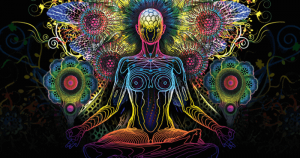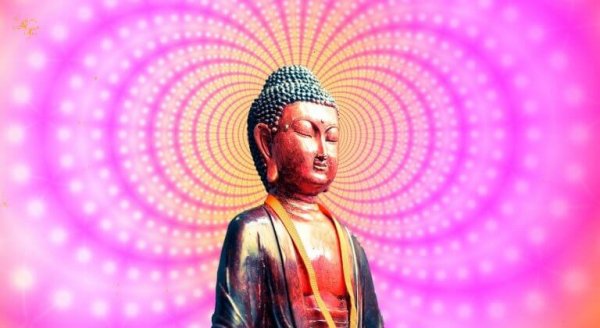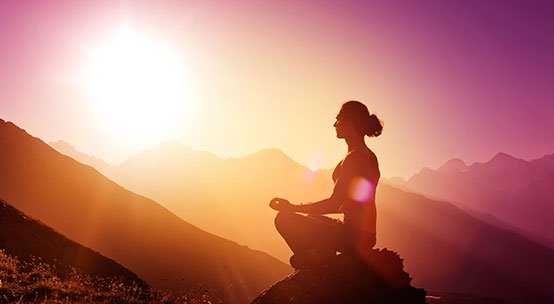5 Meditation Mantras For You to Try

Almost every culture has given a special value to certain words or expressions. In many cultures, they even give them a sacred meaning.
The word “mantra” comes from Sanskrit. It’s made up of two roots: “man,” which means mind, and “tra,” which means protection. So the word “mantra” means protection for the mind.
People who use meditation mantras say the mind is like the sea. Sometimes it’s calm, but other times it moves around energetically. This is especially true when something alters it, whether the action of others or a storm.
It’s in then when we should put mantras to use. They help us calm down and give our mind some peace.
“I believe there is an internal power in each and every one of us…while you connect with the Power within you, you will be more free in every area of life.”
-Louise L. Hay-
The Secret of Mantras
There are words, expressions, and sounds that foster a greater state of relaxation. Mantras are a valuable resource to restore peace, tranquility, and strength in times of great agitation.
Without making an internal effort in our mind, it easily gets overexcited. It also fills itself up with violence, anguish, and unrest. When we use a mantra, our mind goes back to its state of calm.

Mantras have a lot of benefits. For example, they:
- Help decrease our levels of tension and anxiety.
- Calm down our mind, helping lighten our internal conflicts and improving self-control.
- Increase our willpower and strength, thus helping us reaching our goals.
- Help free positive feelings like patience, empathy, generosity, etc.
Mantras work, in a certain way, like subliminal messages. They’re content that’s meant for our subconscious. They go past the threshold of our conscious and penetrate into the deepest regions of our mind.
That’s how they achieve their goal: bringing us to a state of positive consciousness.
Classic Meditation Mantras
Some meditation mantras already have a long tradition. The most well-known come from Buddhism and Hindu culture. In both of those cultures, meditation has a deep value.

There are five meditation mantras people have used for thousands of years. Here they are:
- OM. This is the most universal meditation mantra. In fact, they say it represents the sound of the universe. It’s the sound of the beginning, the fundamental sound, the one that contains all other sounds.
- OM AH HUM. When we pronounce this mantra, we cleanse the place where we’re going to do our meditation. Also, its sound helps improve our concentration.
- OM TARE TUTTARE. This mantra helps concentrate our internal strength. We use it to get rid of internal obstacles. It also encourages bravery and trust.
- OM NAMAH SHIVAYA. It’s a mantra that comes from the Hindus. We pronounce it for well-being and happiness.
- OM MANI PADME HUM. This is one of the most powerful meditation mantras. It invokes essential wisdom, communion with the universe.
Now then, the most important part of these mantras is their sound. Buddhists insist that we shouldn’t reflect too much on what they mean. The essence of it all is in the phonemes and the effects they have on our conscience.
Personal Mantras
Everyone can create their own personal meditation mantras. They don’t even have to be for meditation, they can just be for calming and strengthening yourself.
They are just words and short phrases that have a special power over us. It doesn’t even matter if they don’t have a clear meaning. What’s important is that they connect us to a feeling of peace and strength.

Examples of personal mantras could be: “MOVE FORWARD,” “GROW,” “I AM BRIGHT,” “I AM WELL,” or similar expressions. It’s best to use them for a while and then change them. That’s because repetition gradually decreases the power of their influence on our mind.
Experts in the subject recommend that we avoid using the word “NO” in a mantra. They say it has the ability to block us. So, we should formulate our expressions in positive terms. Instead of saying “I’M NOT AFRAID,” we should affirm: “I AM BRAVE.”
Let’s not forget that the value of a mantra lies mainly with its ability to connect with the internal power we all have.
Almost every culture has given a special value to certain words or expressions. In many cultures, they even give them a sacred meaning.
The word “mantra” comes from Sanskrit. It’s made up of two roots: “man,” which means mind, and “tra,” which means protection. So the word “mantra” means protection for the mind.
People who use meditation mantras say the mind is like the sea. Sometimes it’s calm, but other times it moves around energetically. This is especially true when something alters it, whether the action of others or a storm.
It’s in then when we should put mantras to use. They help us calm down and give our mind some peace.
“I believe there is an internal power in each and every one of us…while you connect with the Power within you, you will be more free in every area of life.”
-Louise L. Hay-
The Secret of Mantras
There are words, expressions, and sounds that foster a greater state of relaxation. Mantras are a valuable resource to restore peace, tranquility, and strength in times of great agitation.
Without making an internal effort in our mind, it easily gets overexcited. It also fills itself up with violence, anguish, and unrest. When we use a mantra, our mind goes back to its state of calm.

Mantras have a lot of benefits. For example, they:
- Help decrease our levels of tension and anxiety.
- Calm down our mind, helping lighten our internal conflicts and improving self-control.
- Increase our willpower and strength, thus helping us reaching our goals.
- Help free positive feelings like patience, empathy, generosity, etc.
Mantras work, in a certain way, like subliminal messages. They’re content that’s meant for our subconscious. They go past the threshold of our conscious and penetrate into the deepest regions of our mind.
That’s how they achieve their goal: bringing us to a state of positive consciousness.
Classic Meditation Mantras
Some meditation mantras already have a long tradition. The most well-known come from Buddhism and Hindu culture. In both of those cultures, meditation has a deep value.

There are five meditation mantras people have used for thousands of years. Here they are:
- OM. This is the most universal meditation mantra. In fact, they say it represents the sound of the universe. It’s the sound of the beginning, the fundamental sound, the one that contains all other sounds.
- OM AH HUM. When we pronounce this mantra, we cleanse the place where we’re going to do our meditation. Also, its sound helps improve our concentration.
- OM TARE TUTTARE. This mantra helps concentrate our internal strength. We use it to get rid of internal obstacles. It also encourages bravery and trust.
- OM NAMAH SHIVAYA. It’s a mantra that comes from the Hindus. We pronounce it for well-being and happiness.
- OM MANI PADME HUM. This is one of the most powerful meditation mantras. It invokes essential wisdom, communion with the universe.
Now then, the most important part of these mantras is their sound. Buddhists insist that we shouldn’t reflect too much on what they mean. The essence of it all is in the phonemes and the effects they have on our conscience.
Personal Mantras
Everyone can create their own personal meditation mantras. They don’t even have to be for meditation, they can just be for calming and strengthening yourself.
They are just words and short phrases that have a special power over us. It doesn’t even matter if they don’t have a clear meaning. What’s important is that they connect us to a feeling of peace and strength.

Examples of personal mantras could be: “MOVE FORWARD,” “GROW,” “I AM BRIGHT,” “I AM WELL,” or similar expressions. It’s best to use them for a while and then change them. That’s because repetition gradually decreases the power of their influence on our mind.
Experts in the subject recommend that we avoid using the word “NO” in a mantra. They say it has the ability to block us. So, we should formulate our expressions in positive terms. Instead of saying “I’M NOT AFRAID,” we should affirm: “I AM BRAVE.”
Let’s not forget that the value of a mantra lies mainly with its ability to connect with the internal power we all have.
This text is provided for informational purposes only and does not replace consultation with a professional. If in doubt, consult your specialist.







